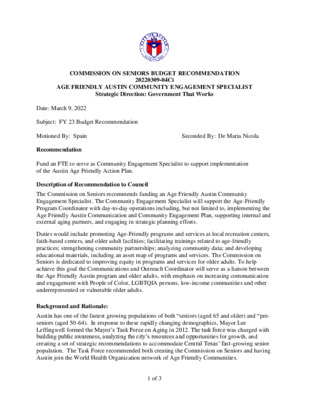BUDGET RECOMMENDATION 20220309-04Ci: AGE FRIENDLY AUSTIN COMMUNITY ENGAGEMENT SPECIALIST — original pdf
Recommendation

COMMISSION ON SENIORS BUDGET RECOMMENDATION 20220309-04Ci AGE FRIENDLY AUSTIN COMMUNITY ENGAGEMENT SPECIALIST Strategic Direction: Government That Works Date: March 9, 2022 Subject: FY 23 Budget Recommendation Motioned By: Spain Recommendation Fund an FTE to serve as Community Engagement Specialist to support implementation of the Austin Age Friendly Action Plan. Description of Recommendation to Council Seconded By: De Maria Nicola The Commission on Seniors recommends funding an Age Friendly Austin Community Engagement Specialist. The Community Engagement Specialist will support the Age-Friendly Program Coordinator with day-to-day operations including, but not limited to, implementing the Age Friendly Austin Communication and Community Engagement Plan, supporting internal and external aging partners, and engaging in strategic planning efforts. Duties would include promoting Age-Friendly programs and services at local recreation centers, faith-based centers, and older adult facilities; facilitating trainings related to age-friendly practices; strengthening community partnerships; analyzing community data; and developing educational materials, including an asset map of programs and services. The Commission on Seniors is dedicated to improving equity in programs and services for older adults. To help achieve this goal the Communications and Outreach Coordinator will serve as a liaison between the Age Friendly Austin program and older adults, with emphasis on increasing communication and engagement with People of Color, LGBTQIA persons, low-income communities and other underrepresented or vulnerable older adults. Background and Rationale: Austin has one of the fastest growing populations of both “seniors (aged 65 and older) and “pre- seniors (aged 50-64). In response to these rapidly changing demographics, Mayor Lee Leffingwell formed the Mayor’s Task Force on Aging in 2012. The task force was charged with building public awareness, analyzing the city’s resources and opportunities for growth, and creating a set of strategic recommendations to accommodate Central Texas’ fast-growing senior population. The Task Force recommended both creating the Commission on Seniors and having Austin join the World Health Organization network of Age Friendly Communities. 1 of 3 Beginning in 2015, Austin’s Commission on Seniors partnered with AARP, AustinUP, regional aging-related service organizations and community members to develop the Austin Age-Friendly Action Plan, a requirement of retaining the Age Friendly designation. In 2016 Council voted to adopt the Age-Friendly Austin Action Plan as an addendum to Imagine Austin. In May 2018, the Commission on Seniors recommended to the Mayor and City Council that “The city provide adequate personnel resources for a Senior Program Coordinator to coordinate implementation of the Age-friendly Austin Action Plan. The position will focus on the successful implementation of the Age-friendly Action Plan goals and strategies through coordination with other city departments, and where necessary, other units of government and outside agencies.” The City Council approved the request, and the first-ever position was filled in February 2019. Today, the Age Friendly Austin Program is spearheaded by its Program Coordinator, Tabitha Taylor MSHE, BS, in collaboration with the Commission on Seniors, City departments, and other community stakeholders. The Age-Friendly Program aims to improve the health and well-being of older adults by implementing and advocating for Age-Friendly programs, policies, and practices across the City of Austin. The Age-Friendly Program and its partners challenge the city to do more to prepare for the rapid aging of Austin’s population. Notable examples of age-friendly programming and advocacy efforts include the formation of Austin’s Seniors Task Force, Parks and Recreation Department’s Varsity Generation Programming, and the Social Inclusion Task Force. Seniors Task Force & Emergency Response Many Covid response services were led by personnel from the City of Austin’s Public Health Department and Travis County Health and Human Services. Age-friendly Program Coordinator Tabitha Taylor helped lead the Austin/Travis County COVID-19 Emergency Operation Center Senior Task Force throughout the pandemic to communicate the needs of older adults including efforts to combat social isolation and access to safe and reliable testing and vaccination sites. The Seniors Task Force has also been vital in elevating the needs of older adult through city-wide emergency preparedness recommendations and resolutions. Varsity Generation Programming the Austin Parks and Recreation Department offers a variety of Varsity Generation programs and services for people 50 years of age and older. Activities include traveling, pursuing old hobbies and learning new ones, socializing with friends, meeting new people, increasing knowledge, becoming, and staying physically fit, supplementing income, contributing to the community and much more! Social Inclusion Task Force The Austin Social Inclusion Task Force is a collaborative working group composed of representatives from local and national senior services organizations, the City of Austin, and the University of Texas at Austin. The Task Force, led and organized by the Aging Services Council, came together to explore ways to bridge the digital divide for older adults isolated by the Covid- 19 pandemic. Today, the group is dedicated to equipping vulnerable populations at higher risk for social isolation with technological resources by advocating for policy changes, increasing funding, supporting further research, and increasing collaboration and awareness among government agencies, organizations, and businesses. 2 of 3 Despite the success of the Age Friendly program and partnerships, the Commission frequently hears from older adults who are frustrated with trying to find information about programs and services. This is especially true for older adults in communities of color. For example, the Commission drafts and widely distributes an annual budget survey as a tool to get community input on budget recommendations. However, the majority of survey respondents are white women aged 65-74. The Commission on Seniors prioritizes equitable access to resources for older adults across the community and we believe this goal will be accomplished with a staff person dedicated to community outreach and education. Vote For: Briesemeister, Varteressian, Angel, Bauman, Bordie, De Maria Nicola, Garcia-Pittman, Kareithi, Lopez-Guerrero, Lugo, Spain, Temperley, Van Sickle Against: None Abstain: None Absent: Cagle Attest: Janee Briesemeister, Chair 3 of 3